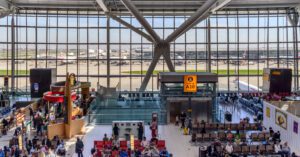Heathrow Airport has reported a record-breaking 39.8 million passengers in the first half of this year, surpassing pre-pandemic levels and signalling a strong recovery.
The airport, located on the western fringes of London, experienced its busiest day ever on June 30, with more than 268,000 travellers on over 1,300 flights.
This record surpasses the 38.8 million passengers recorded in the first half of 2019, before the coronavirus pandemic. Despite the surge in passenger numbers, revenues for the six-month period fell by 2.9 per cent to £1.69 billion, and adjusted earnings dropped by 11.1 per cent to £951 million. However, pre-tax profit increased by 15.8 per cent to £323 million, swinging from an adjusted loss of £139 million to a profit of £178 million.
Growth has been driven by high load factors and the use of larger aircraft, particularly on routes to Asia and the Middle East, which have seen demand double in recent years. In anticipation of a record number of passengers this summer, Heathrow has ramped up its workforce to 90,000 employees, aiming to avoid past chaos and improve punctuality, which stood at 72.8 per cent in the first six months of the year. Over 95 per cent of passengers passed through security within five minutes.
However, revenues from flights, including landing fees, aircraft parking charges, and passenger security fees, dropped by nearly 8 per cent due to the Civil Aviation Authority’s stringent H7 settlement. This settlement sets the annual cap on passenger charges paid by airlines and frames the regulatory environment for Heathrow since 2022.
The airport is working to address a £400 million shortfall from the settlement, introducing initiatives to streamline operations and drive efficiencies without compromising passenger experience or safety. These efforts have contributed to an adjusted pre-tax profit of £178 million in the first half.
Heathrow’s strategy includes six “beacons” aimed at making it an extraordinary, future-ready airport. These strategies focus on building a “winning team,” embracing a “digital future,” and “creating capacity,” all intended to deliver the greatest “value for customers.”
Thomas Woldbye, Heathrow’s CEO, praised his team’s dedication in managing record-breaking passenger numbers while maintaining excellent customer service. Alongside the passenger traffic, 765 tonnes of cargo passed through Heathrow, supporting British industries in accessing global export markets.
Woldbye emphasised the importance of Heathrow to the UK economy and called for policy support to enhance global competitiveness and sustainable growth. He expressed optimism about the new government’s recognition of Heathrow’s role in national growth and urged for policies that would establish Heathrow as the preferred European hub airport.
Despite attracting new routes and record passenger numbers, Heathrow faces competitive pressures from European hubs due to bureaucratic tax and border policies that push passengers towards rival airports.
Read more:
Heathrow passenger numbers hit record 39.8 million amid busiest summer preparations

